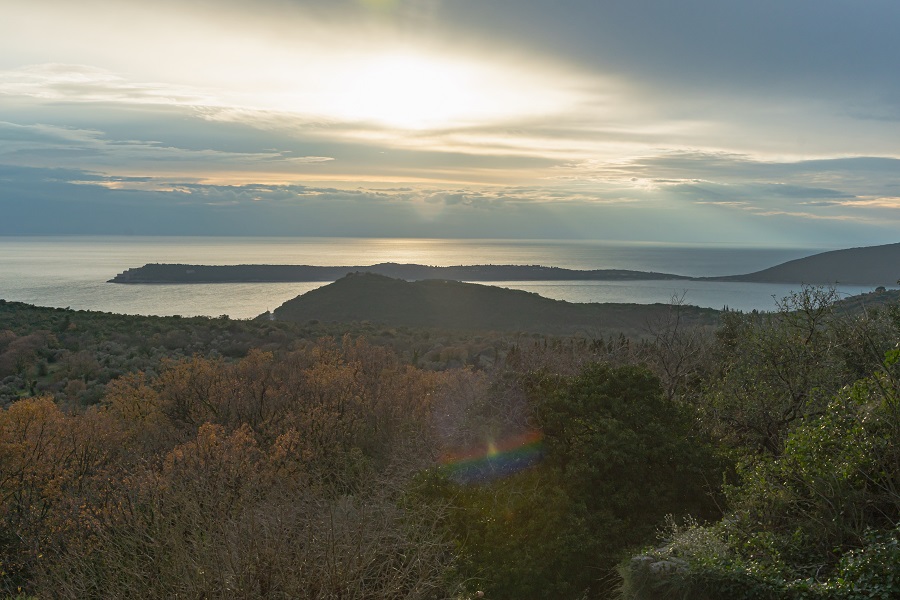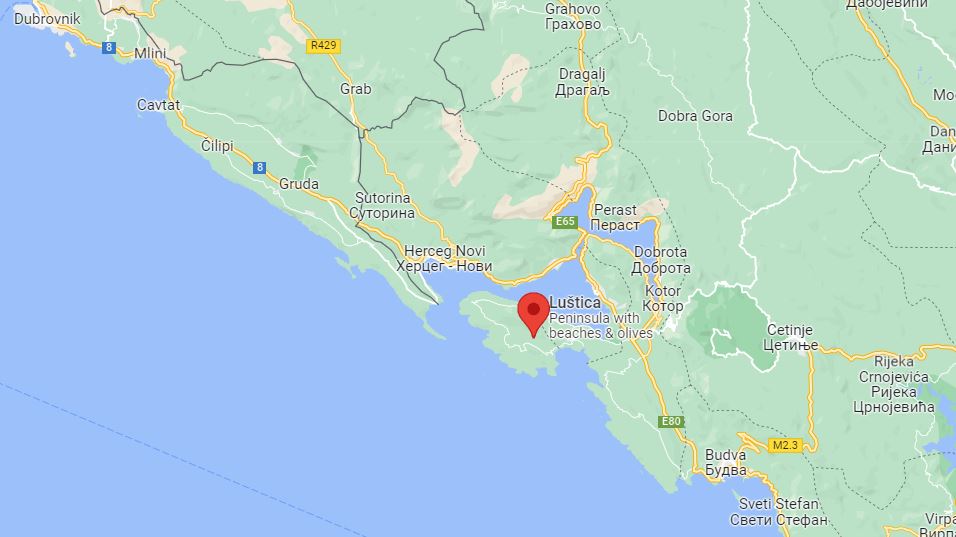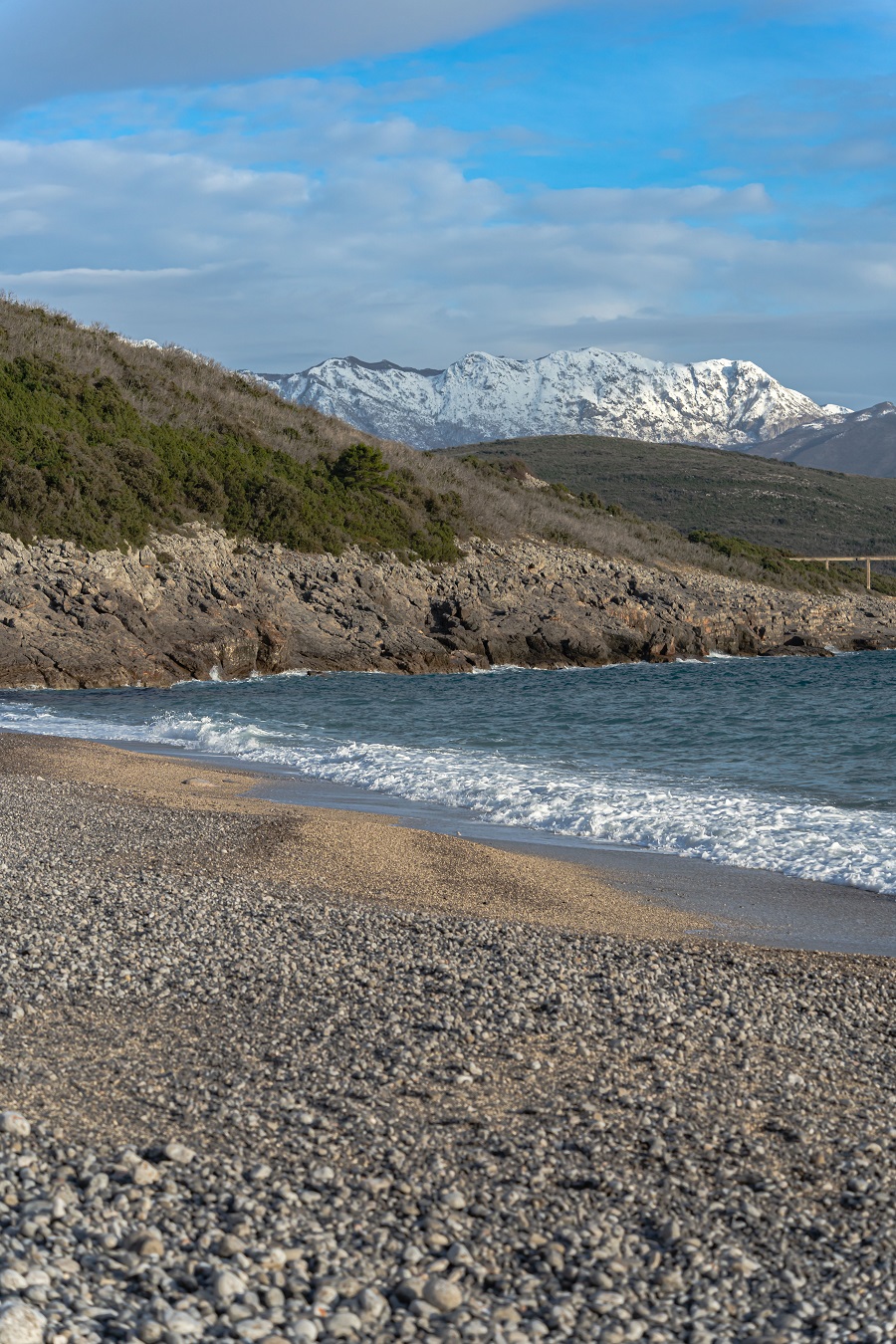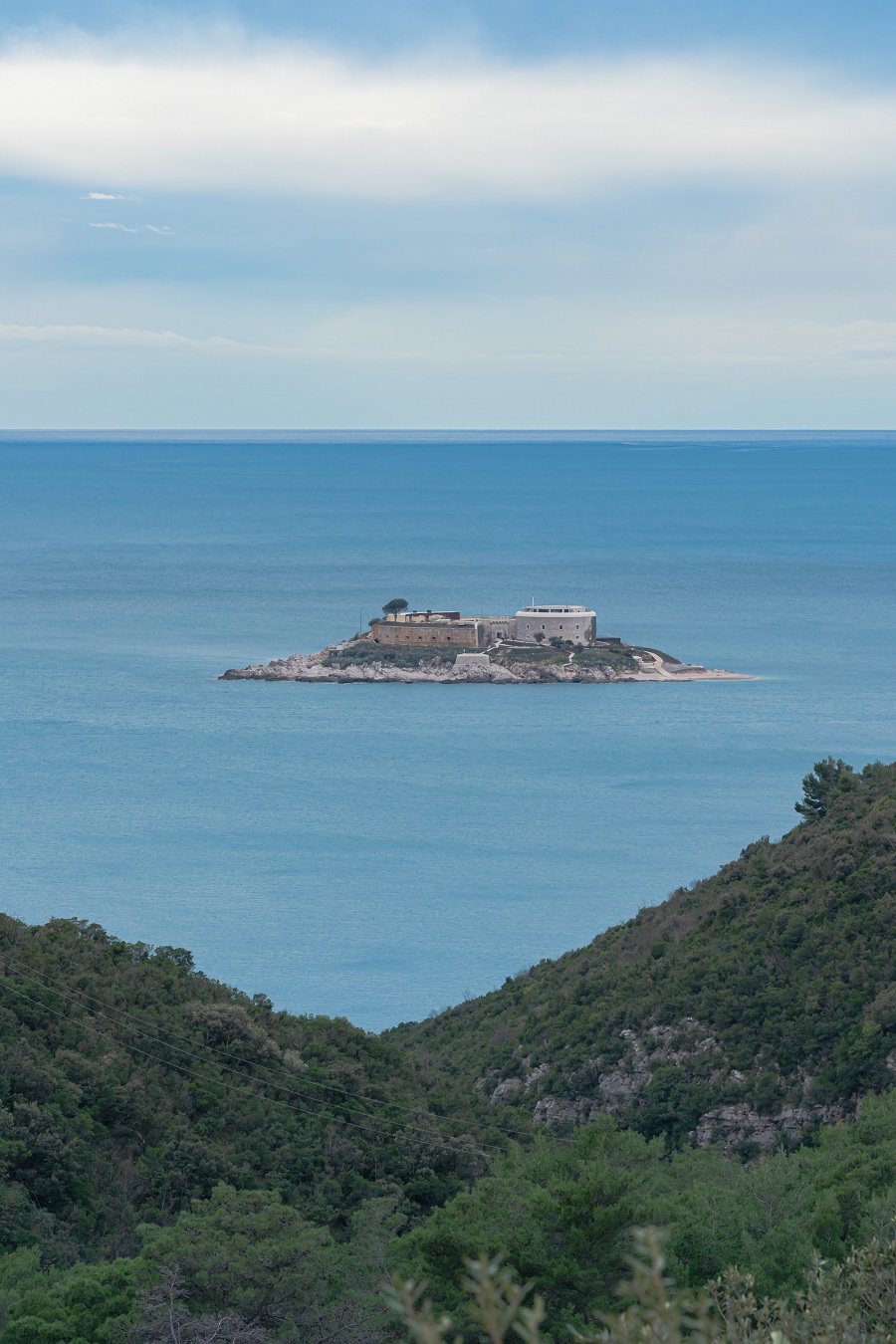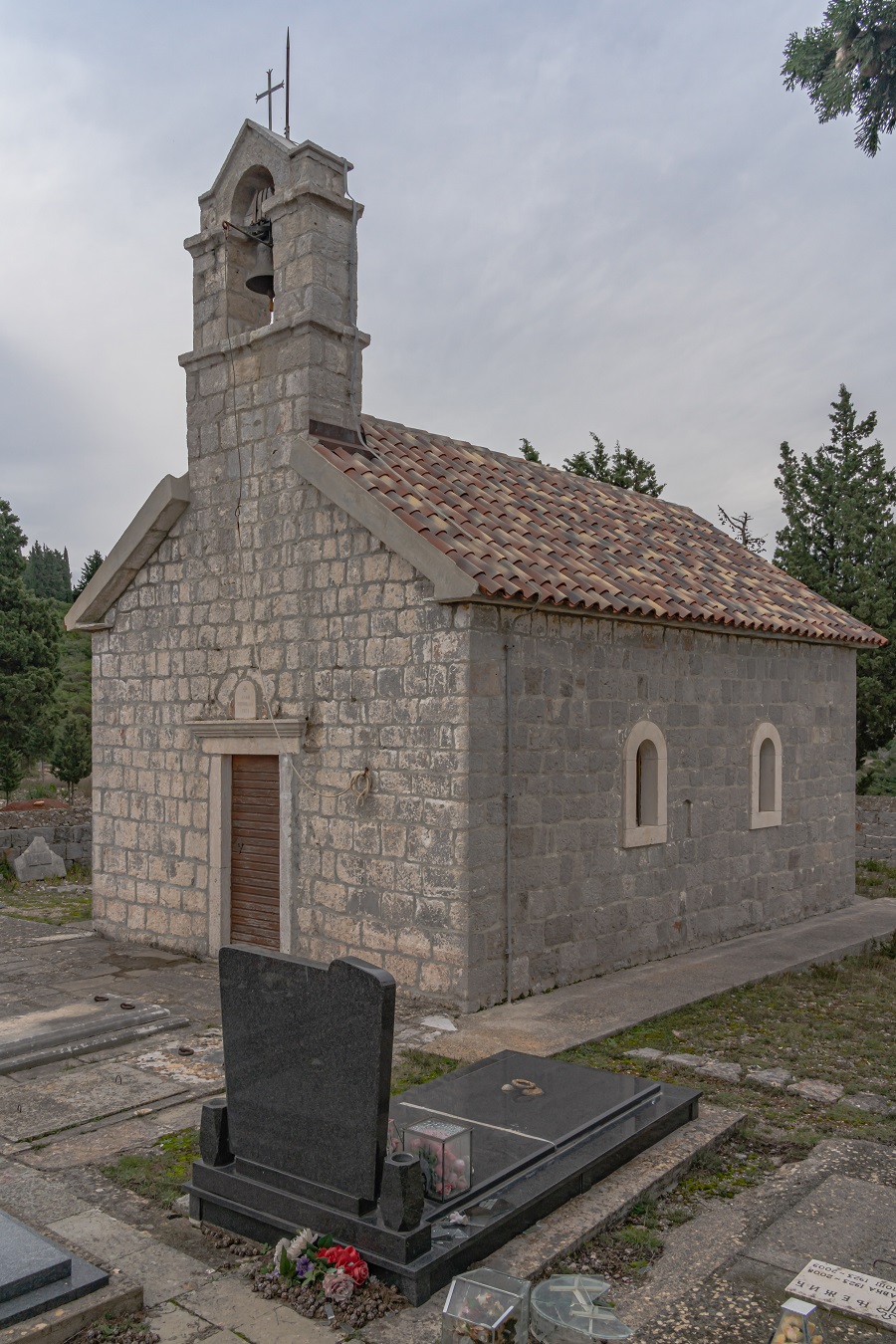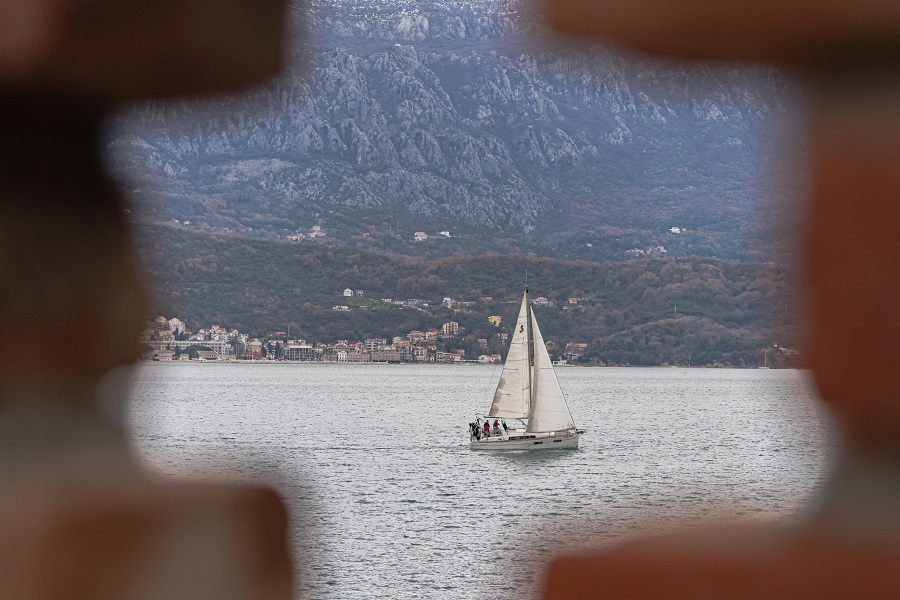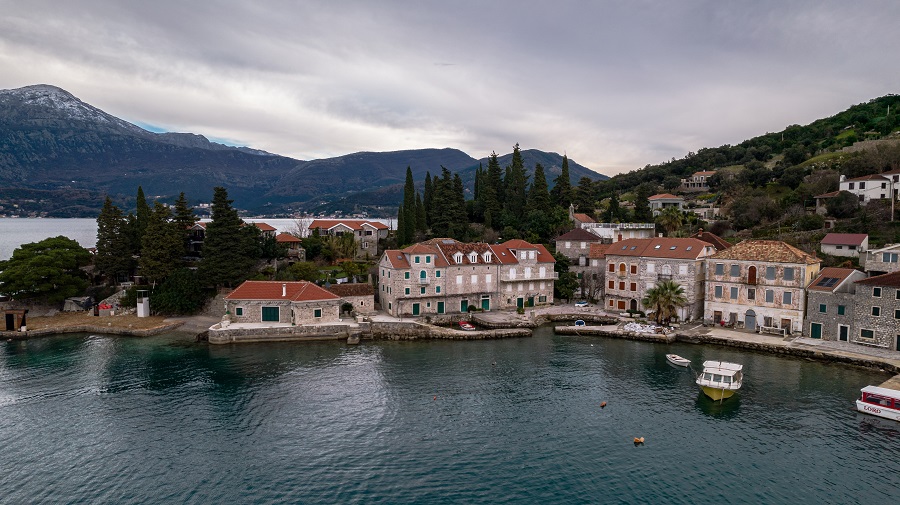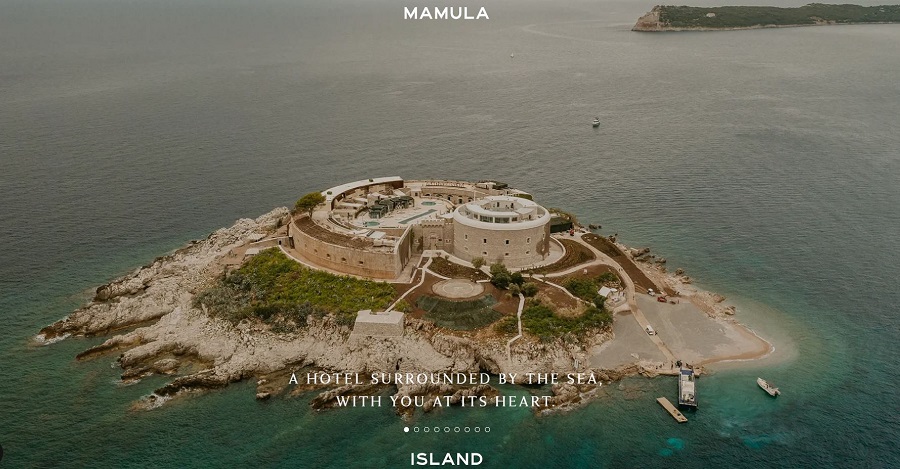Natural, Luxury Lustica, Breaking the Montenegro Overbuilding Stereotype
February 3, 2023 - It is always instructive to observe tourism in other countries. Some surprising and delightful discoveries in the natural, luxury Lustica peninsula in Montenegro, far removed from the Montenegrin coastal overbuilding stereotype. And VERY accessible.
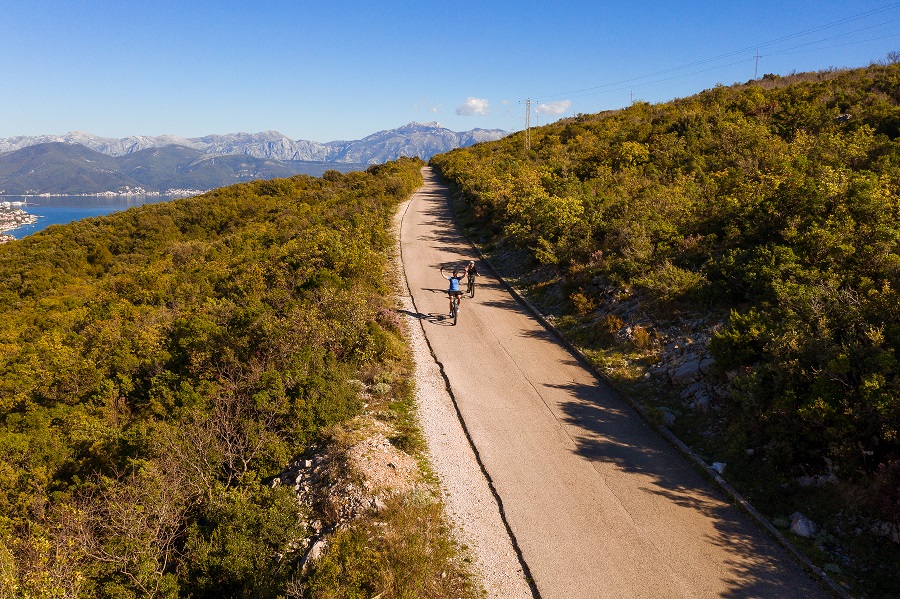
January is not traditionally the most popular month for tourism in Croatia or the wider region, but increasingly I look forward to the start of every new year. There are no crowds, and many places are shut, but it does give an opportunity to explore regions stripped back to their bare essentials. If you have never visited Dubrovnik in winter, for example, I heartily recommend it. The old town, with most of the cafe tables and chairs in hibernation, is brought back to its original stone - and is truly magical without the crowds. Of course if you happen to be here today, for the Feast of St Blaise, there is no finer time to visit.
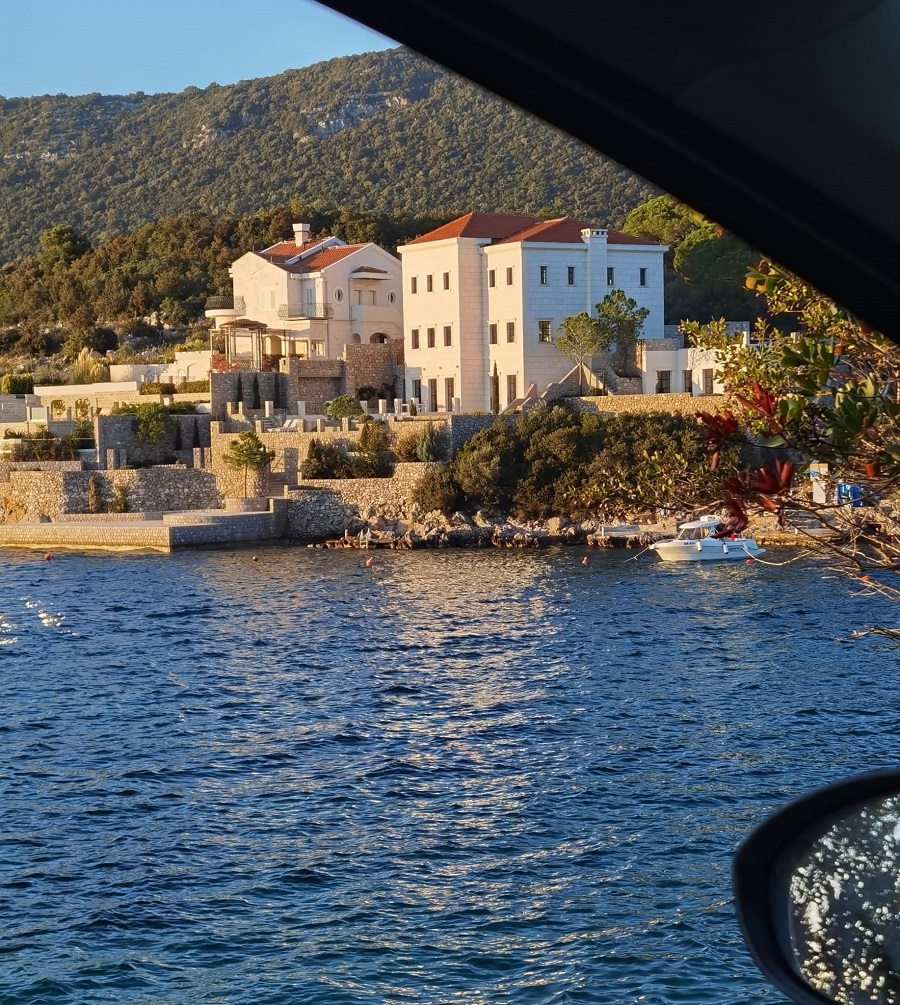
After a great start to the year at the epic Osijek Wine Fest recently, I was delighted to accept an invitation from The Chedi Lustica Bay to come and explore the Lustica Peninsula in Montenegro in late January.
Montenegro. As soon as I mention the word in some quarters, I immediately get comments (as I will from this article) from my Croatian readership informing me how the Montenegrin coast has been ruined by overbuilding, and how many decades Montenegro is behind Croatia in tourism.
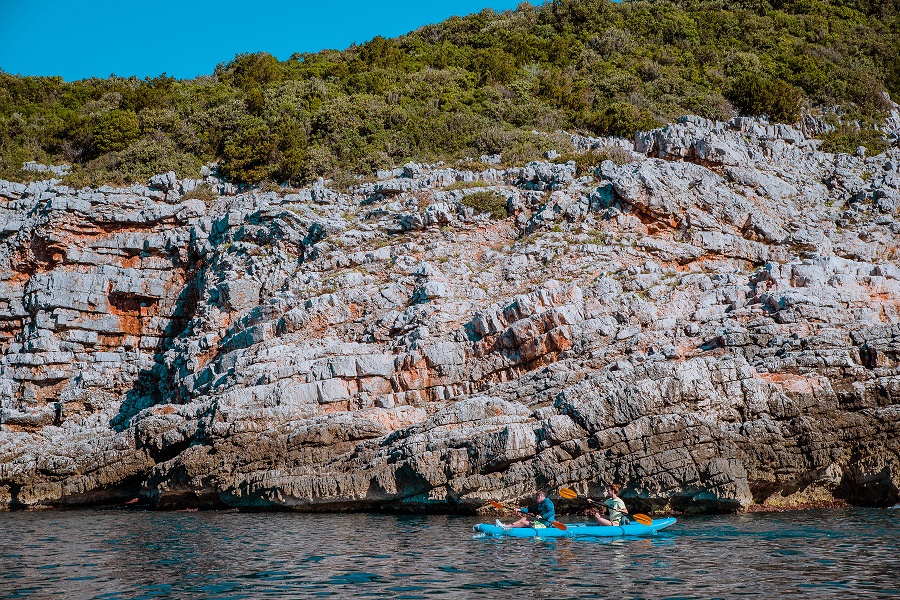
And each time, I smile. For while there is often a large element of truth to a stereotype (and the chronic overbuilding of Budva is indefensible, for example), it is also true that not everywhere is tarred with the same brush.
I want to take you on a journey - a journey which starts for many at a roundabout, to a Montenegro that was my reality for a week last month, and which does not change that much, even during the season.
As you can see from the map above, the main road (and the main overrbuilding) from Dubrovnik to Albania passes through Herceg Novi, Tivat, and Budva. Here you can find pockets of true beauty, and several examples of overbuilding. A short drive from Tivat Airport (an airport connected 365 days a year to Belgrade and the world via the Air Serbia network) brings you to a roundabout, probably the most important roundabout for tourism in the whole country.
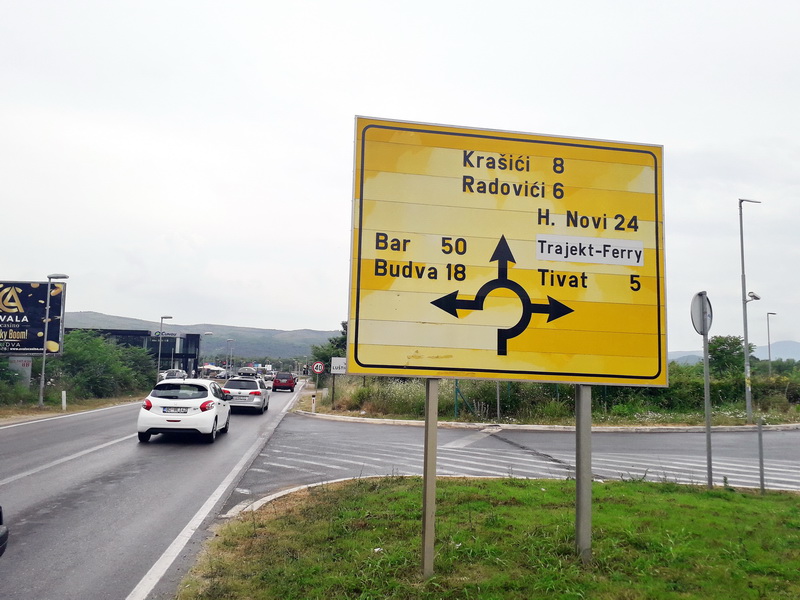
(The most important roundabout in Montenegro, approaching from Kotor. To the left, Budva, to the right Tivat and airport, and straight on to where the real magic happens - Lustica Peninsula)
Turn left from Tivat Airport, and you head through the tunnel to spectacular Kotor and the majestic World Heritage Site of Boka Bay. Continue straight, and I wish you luck on your Budva odyessey.
Or take a right, and take The Road Less Travelled.
Welcome to Lustica! Wikipedia introduces the Lustica peninsula as follows (excerpts):
The peninsula has an area of 47 km² and is 13 km long. The highest point of the peninsula is Obosnik peak, at 582 m. It has 35 km of coast, which accounts for 12% of Montenegrin coastline.
The area has twenty churches, out of which eighteen Orthodox and two Catholic ones. Once an isolated community, there are farms and smallholders producing their own olive oil, cheese, prosciutto, wine and rakija from local ingredients.
Luštica is largely undeveloped with populations of wild boar, mongoose, jackal and edible dormice. Nightingales and Scops-owls can also be heard in abundance. Olive groves are also plentiful although many are uncultivated and overgrown.
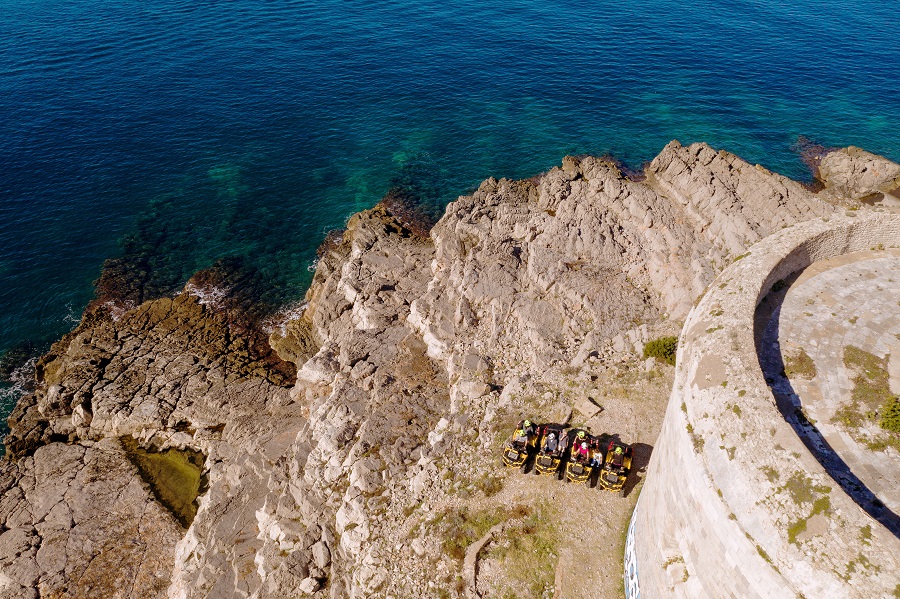
It is an area of extreme natural beauty, as I hope the accompanying photos in this article demonstrate. The kind of underdeveloped, traditional way of life so at odds with that Montenegrin stereotype.
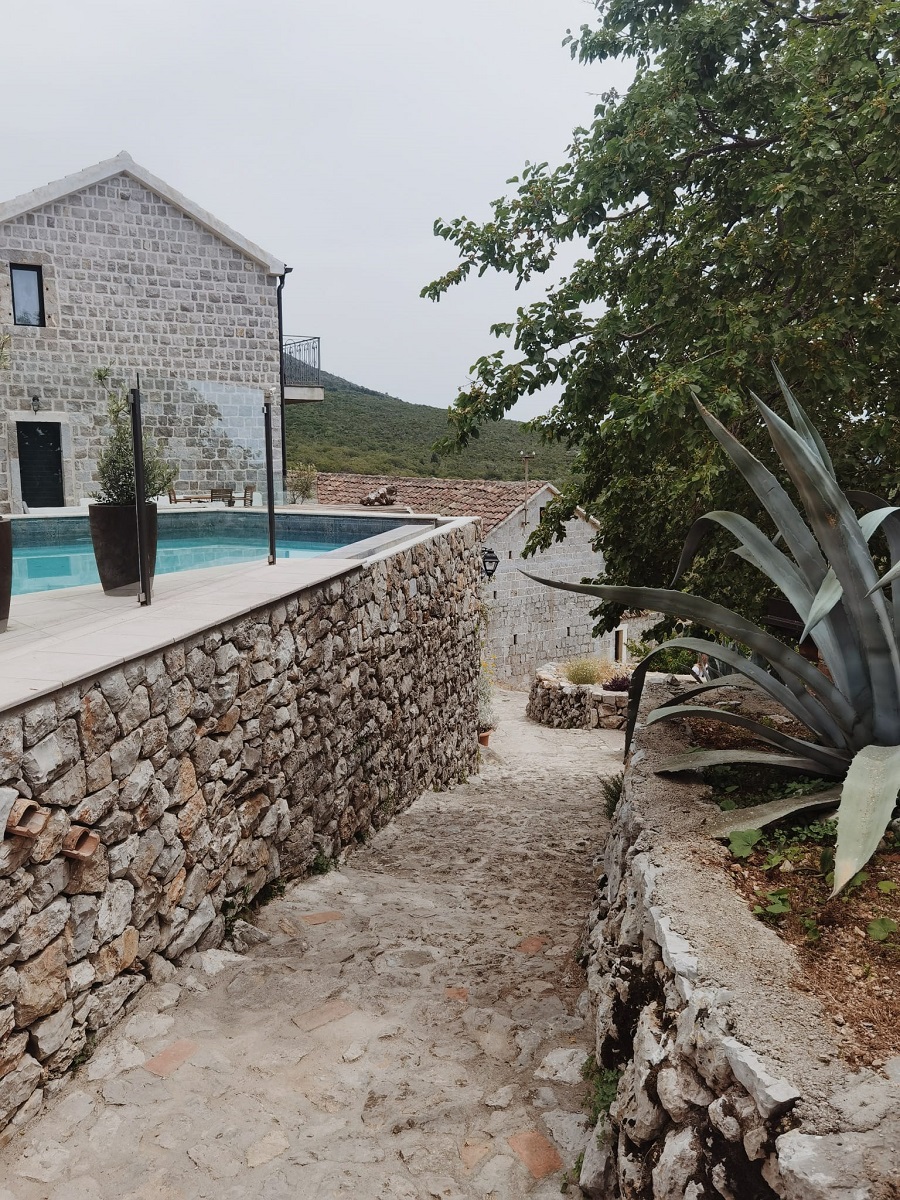
But Montenegro is a tourism country, and it is to be expected that an area with 12% of its tiny coastline would be geared towards tourism. However, far from going down the route of mass apartments and cheap summer tourism, Lustica has a far more positive and sustainable destiny, all meticulously planned in one project, the largest single investment in the history of Montenegro - Lustica Bay.
Swiss-Egyptian company Orascom Development Holding, in partnership with the Montenegrin government, is developing a whopping 7 million square metre section of the peninsula for a higher level of tourism, with a strong strategy to put nature and the traditional way of life mixed in with a more luxurious tourism offer. In an age of illegal building, where one neighbour's 'vision' can destroy the look of an entire street, having a responsible masterplan for such a large area offers a new perspective on luxury tourism, not only in Montenegro but the entire region.
Two marinas, seven hotels, a village of 2,500 people (with units selling very fast at the current price of 4,500 euro/m2, and about to go higher), and an 18-hole golf course as well. That still leaves a lot of space in that 7 million m2 to enjoy the nature and traditional way of life.
The initial flagship hotel, The Chedi, is marking its fifth anniversary this year. Unlike the majority of Croatian hotels, it is open all year, has an incredible team spirit, and if there is a better guest experience on the Adriatic, I have yet to hear about it. And probably the most surprising fact I learned in my week on Lustica was something which I doubt can be emulated on the Croatian Adriatic.
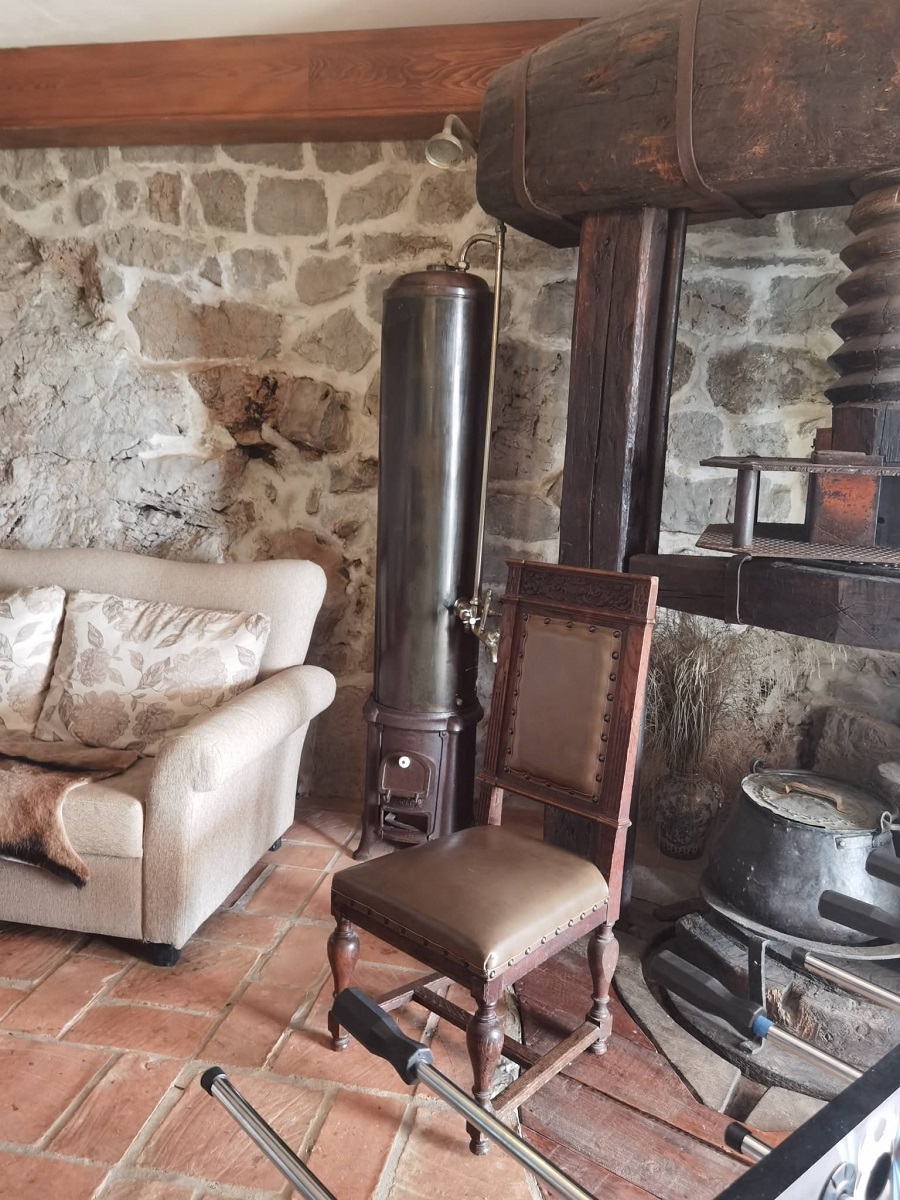
As Croatia's hotels, mostly open only 6-8 months a year, scramble to find seasonal guests each summer, The Chedi has no less than 35 full-time employees who will celebrate 5 years of employment at the hotel this year, as well as another 12 who have been there for 3 years and more. An investment into a 12-month product that provides careers, not seasonal jobs, for its staff.
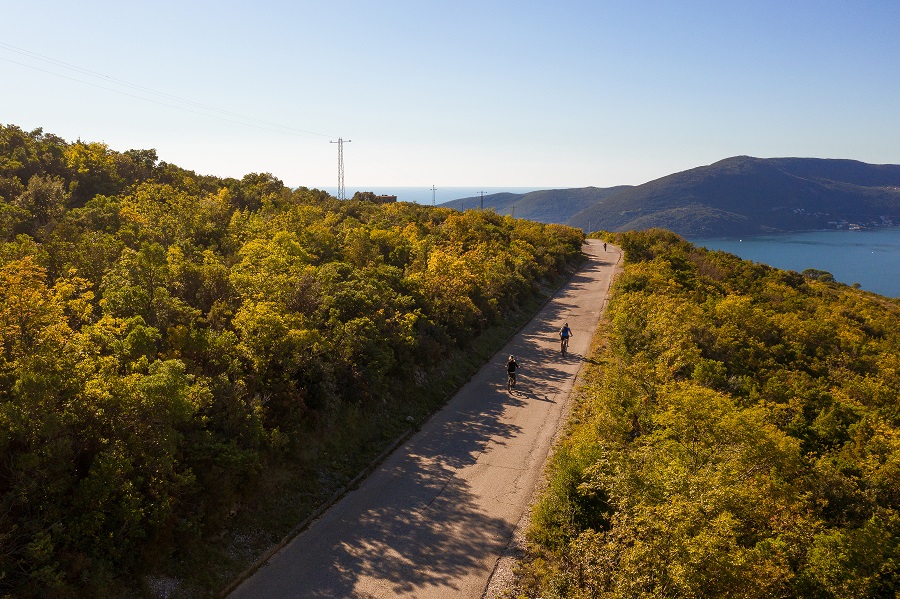
And The Chedi is not alone. The Regent and Porto Montenegro, as well as One&Only and Portonovi are also open all year. Feeling hungry? A restaurant from Lustica to Porto Montenegro in January will give you a choice of Montenegrin, Indian, Spanish, Chinese, French, Italian, Asian, and Mexican, with Austrian ice cream for dessert. With the exception of Split, how many coastal destinations in Croatia could match that offer in peak season, never mind January?
(Author's note - this is not about bashing Croatia at all, it is about understanding - and perhaps learning from - what is happening in the neighbourhood)
The Chedi will be joined this year by the second 5-star hotel, luxury Mamula on the tiny island of the same name, thereby offering two very different top-end tourism experiences on the peninsula.
But while the luxury is all very welcome for guests with money to spend, the true magic of Lustica is not the luxury, but the space and stunning nature that it offers, as well as the seamless proximity to the essence of Lustica and its traditions and nature for visiting guests.
It is an exceptional adventure playground, on land and on sea. Traffic is a fraction of the rest of the coast, and there are so many ways to explore - kayak, sailing, hiking, cycling, and quadbiking. Here is your favourite fat Englishman on a quad on Lustica in October, 2020 - and with all the restrictions of lockdown, never have I appreciated the freedom and nature as much. You can more about this trip in Lessons from Montenegro: Wild Beauty & The 'Old Normal' at The Chedi Lustica Bay.
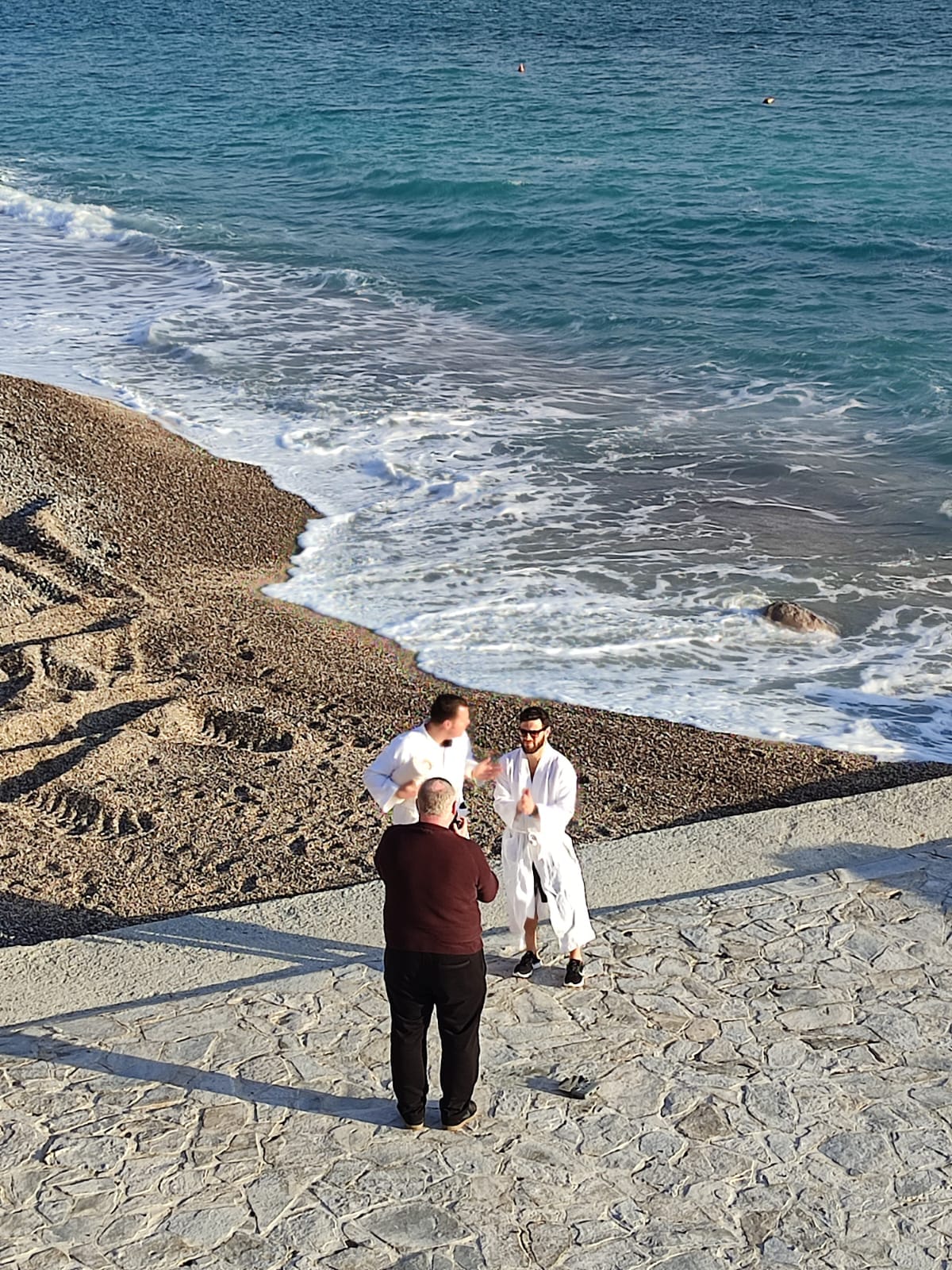
Some even choose to swim... in January!
Of course, having a luxury adventure playground without interacting and involving the local population misses the point of sustainable tourism. Working with locals to enhance the authentic tourism experience benefits all stakeholders. And it was here that I came to appreciate the magic of Lustica most of all on this trip.
As part of our week filming in Montenegro, star Chedi employee Aleksandra took us on a tour of her favourite spots on Lustica - all accessible to guests and the general public - but she saved the true magic of the tour to the very end.
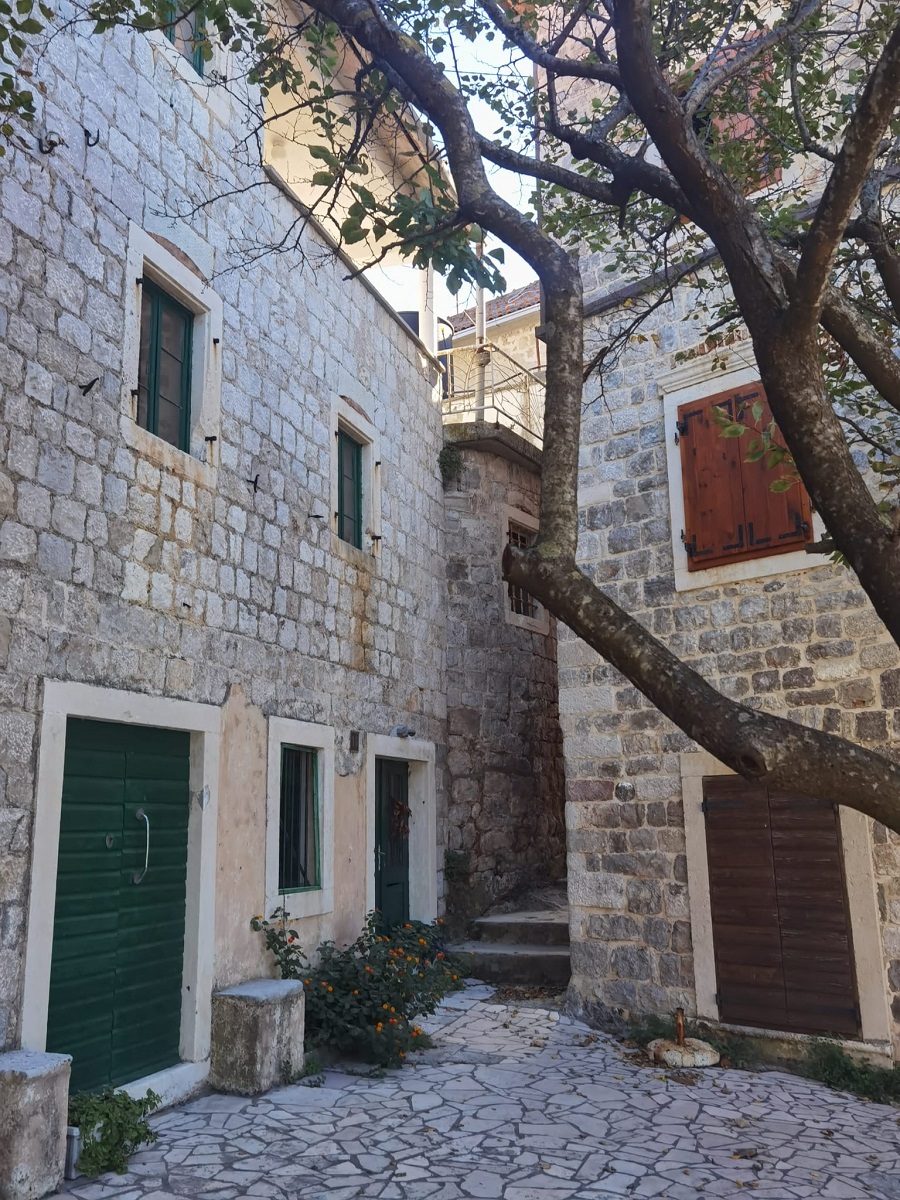
"There is a very interesting local guy I want you to meet. He has a really interesting tourism project, and our guests love it."
And so it was that I was introduced to Bogdan, founder of the extraordinary Klinci Village Resort in the tiny village of Klinci.
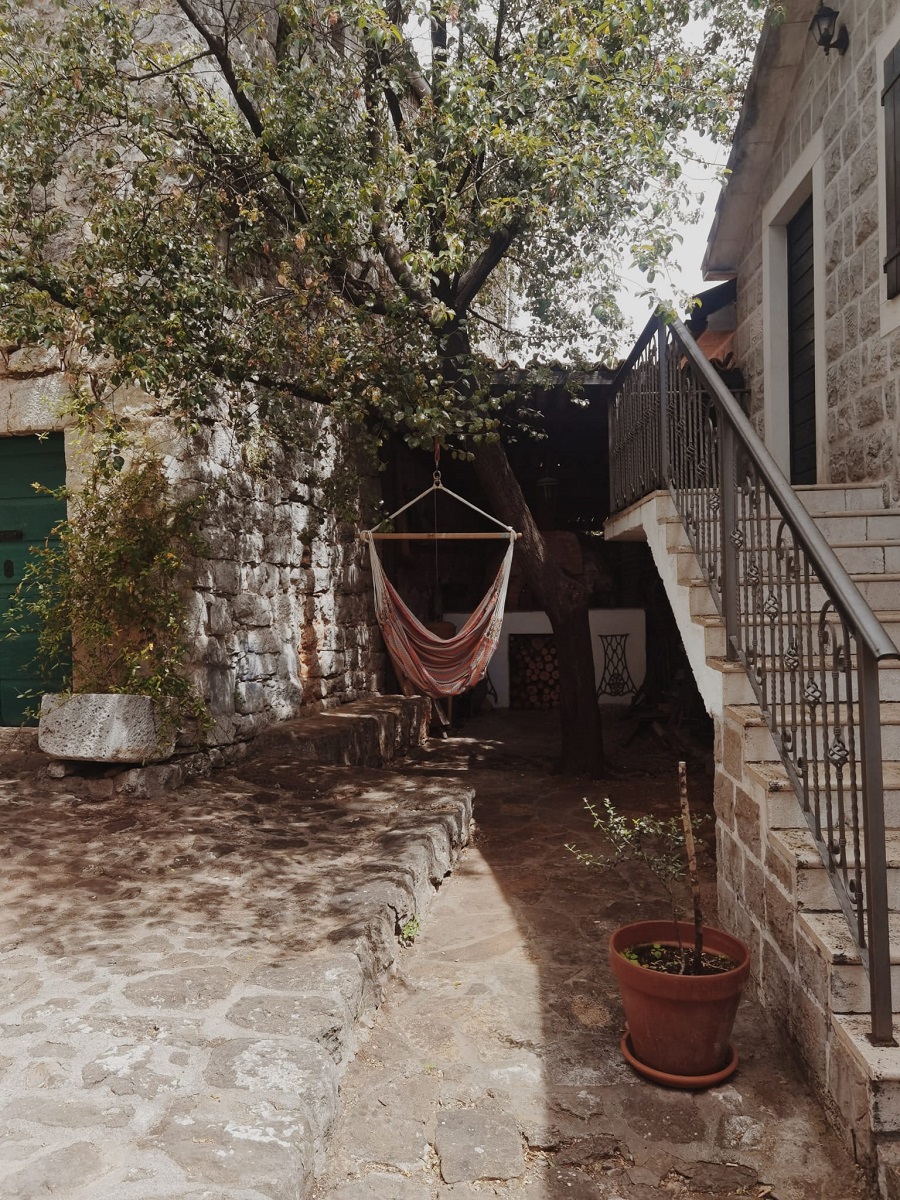
A village which has been beautifully restored thanks to the efforts of Bogdan and his wife.
A village of just 8 people, but with a wonderful 4-star authentic eco-resort, with all food sourced from within one kilometre.
A village of 8 people but 5 churches.
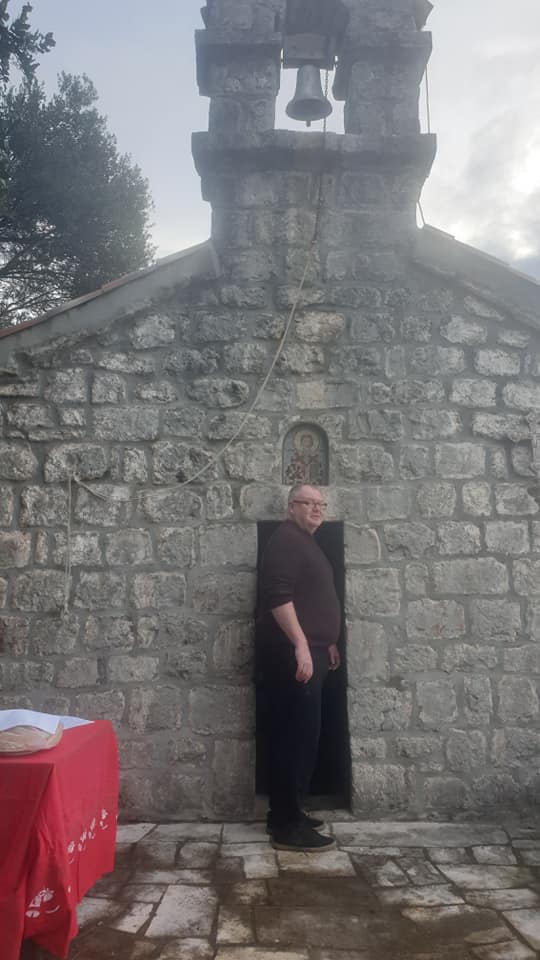
A village of 5 churches, but just 4 that this fat blogger could enter.
A village of 5 churches, one of which was built in just 24 hours on New Year's Eve in 1799, and which celebrates the Feast of St. Sava on January 27. So small is the church that only the priest and his assistant can enter. The service is conducted with them inside and the congregation of 20 outside. We will be producing a video story on my YouTube channel for anyone interested.
Bogdan was kind enough to invite us back two days later for the church service and obligatory rakija and cakes at 09:30 with spectacular views out to the Adriatic. The small gathering of 20 included a Canadian woman who is a regular guest and discovered the magic of Klinci more than a decade ago.
And after such a stimulating morning of local culture and conversation, it was back to The Chedi for a waterside lunch at The Spot, followed by an afternoon of pool, the golf simulator, and massage.
Natural, Luxury Lustica - truly the Montenegrin coastal story which bucks the stereotype.
It would be wrong of me not to acknowledge that there are challenges, both in terms of infrastructure and connectivity, but these are both improving too. The Lustica Bay development is building better roads to service the needs, but there is also one intriguing development that will be a huge plus for luxury tourism in the Boka region.
It is no secret that the border crossing from Dubrovnik Airport leads to delays in summer, something that will probably be exacerbated with Croatia now in the Schengen Zone. Tivat does a fine job connecting Lustica to the world all year, but its capacity is somewhat limited. Onward travel from Tivat Airport is about to get MUCH easier with the development of a harbour at at the end of the runway. Whether or not it will happen for this season is open for discussion, but it is coming.
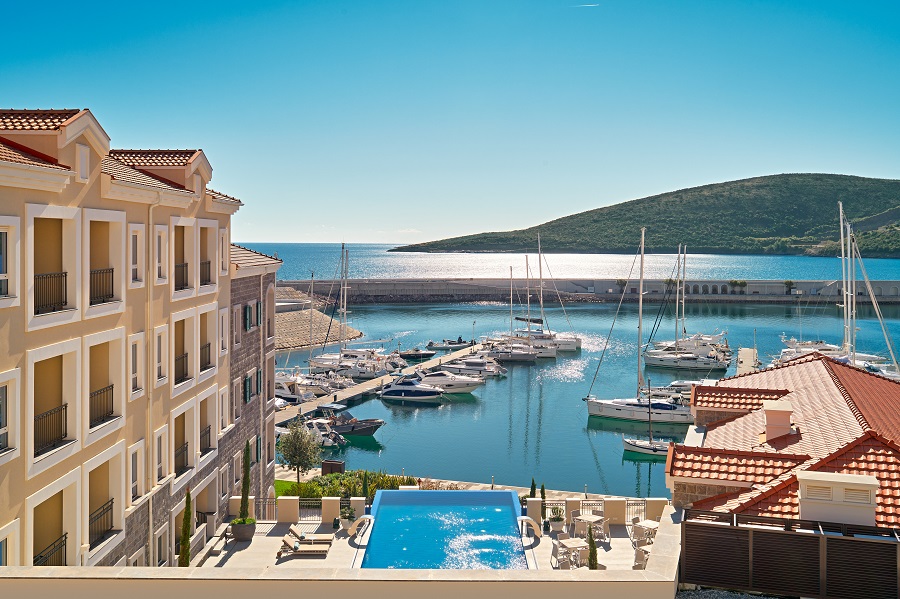
(My bedroom view at The Chedi, January 2023)
And then imagine. New York - Belgrade - Tivat - speedboat - Luxury Lustica, a seamless connection, with not a car in sight.
You can learn more about the magic of The Chedi from the official website.
****
Paul Bradbury was a guest of The Chedi in January 2023
****
What is it like to live in Croatia? An expat for 20 years, you can follow my series, 20 Ways Croatia Changed Me in 20 Years, starting at the beginning - Business and Dalmatia.
Follow Paul Bradbury on LinkedIn.
Subscribe to the Paul Bradbury Croatia & Balkan Expert YouTube channel.
Croatia, a Survival Kit for Foreigners is now available on Amazon in paperback and on Kindle.

Looking for a Job in Croatia? This Week's Top 10 from Posao.hr (February 3, 2023)
Febuary 3, 2023 - Looking for a job in Croatia? A new weekly feature on TCN, in partnership with leading job site agency, Posao.hr, who present a selection of weekly job listings.
How hard is it to find a job in Croatia, and what is on offer?
We spoke to Ines Bokan, director of leading jobs site Posao.hr, who kindly took the time for this excellent interview overview.
Pfizer Inc is hiring a person for the position of Medical Affairs Scientist Croatia (m/f). Place of work Zagreb. Send complete applications via link by March 3th.
dotSource is hiring a DevOps Engineer (f/m/x). Workplace Rijeka. Your work-life balance is important to us – flexible working hours, home office and fitness incentives. Send complete applications via link by Feb 11th.
Skiper Hoteli d.o.o. is hiring a person in the position of IT coordinator (m/f). Place of work Savudrija (Umag) - Croatia. We offer incentive incomes and additional work bonuses. Send complete applications via link by March 1st.
Sunce Hoteli d.d. / Bluesun is hiring a person in the position of Specialist in Human Resources (m/f). Place of work Tučepi, Brela. The possibility of advancement and additional training. Send complete applications via link by Feb15th.
MED-EL Elektromedizinische Geräte GmbH is hiring a Senior Software Engineer (m/f/d). Place of work Innsbruck, Tirol - Austria. Send complete applications via link by Feb 18th.
Strabag BRVZ d.o.o. is hiring for the position of Senior Software Developer (m/f/d) in Zagreb. They are looking for excellent Java know-how, several years of practical experience in web technologies, and a team player with analytical thinking. Send complete applications via the link by Feb 15th.
CCPORTER Sp.z.o.o. is hiring a Sales Advisor with Croatian (m/f). They offer you work from home, a competitive basic salary and an attractive bonuses depending on the sales. Send complete applications via the link by Feb 23rd.
Jet2.com is hiring a Duty Manager (m/f) in Dubrovnik. They are looking for an inspirational leader committed to the development of others, passionate about delivering the highest standards of customer service and safety, with excellent administration skills and strong operational experience within an airport environment. Send complete applications via the link by Feb 20th.
Workforce, for a client, is hiring an IT Application Specialist (m/f) for remote work – within Croatia. They are looking for a good level of English, experience with ERP systems as a key user, and advanced knowledge of MS SQL. Send complete applications via the link by March 1st.
Next Step career network is hiring a Junior Hotel Management Executive (m/f) in Austria. They offer you net monthly salary €2.500, 14 full salaries a year, and a full social benefit package. Send complete applications via link by Feb 17th.
For more career options and job listings, visit posao.hr.
![]()
These weekly job listings will appear in the weekly TCN newsletter - you can subscribe here.
****
What is it like to live in Croatia? An expat for 20 years, you can follow my series, 20 Ways Croatia Changed Me in 20 Years, starting at the beginning - Business and Dalmatia.
Follow Paul Bradbury on LinkedIn.
Croatia, a Survival Kit for Foreigners is now available on Amazon in paperback and on Kindle.
A Week in Croatian Politics - Kosovo, Energy Prices and the Uhljeb Curse
February the 3rd, 2023 - This week in Croatian politics, we've had energy price woes, ''uhljebljivanje'' through exposed messages, and questions by experts about precisely what Croatia is trying to do by allowing Zoran Milanovic to make such confusing and politically damaging statements about the Russia-Ukraine war.
The government is looking into what it can do when it comes to energy prices after the 1st of April this year
Energy costs are still causing a lot of concern among the general public and particularly among businesses who are struggling to pay their often extortionate bills. With an unusually mild winter seeing us avoid what could have been a much worse scenario, the government is now busy looking into what it can do when the measures they put in place expire (April the 1st, and it certainly is no joke). Claiming that the costs for energy would have been far higher and caused more issues had the government not capped their prices, Plenkovic has assured the public that his ministers are analysing the situation and seeing what they can do as we edge towards spring.
Prime Minister Andrej Plenkovic stated that without government measures, energy prices for many companies and individuals would have been much higher, adding that the ministers are currently analysing what the situation will be after April the 1st, given that government measures regarding these prices will last until March the 31st.
Given that some distributors have announced price increases of their own, journalists were naturally interested in whether the policy of regulating electricity and gas prices will continue from April the 1st, to which Plenkovic replied that the ministers of finance and economy are in charge of "preparing and analysing the situation for after that date".
"We believe that the [energy] price situation will stabilise"
Yesterday, the CBS published the first estimate according to which inflation during the month of January of this year (when compared to January 2022) was on average higher by 12.7 percent, and compared to December, prices remained the same on average. Plenkovic rated that announcement as very good.
"Obviously, the trend of inflation growth that we had in the last months of 2022 is now slowly going down, which is in line with the forecasts of the government and the European Commission (EC). We believe that the situation with prices will stabilise and that at this time next year we'll be talking about an annual inflation rate of around six percent, which would be very good considering these crisis circumstances," said Plenkovic after the government session.
Government spokesman Marko Milic allegedly sent messages to Croatian Forests (Hrvatske sume) to get his friend a job in the classic ''uhljeb'' fashion - he says not all is what it seems
Government spokesman Marko Milic recently had his alleged messages exposed by Nacional, in which he was organising for his friend to be employed within Croatian Forests. This type of employing peoples' friends, cousins, former housemates and estranged aunts who are in no way qualified to do the task at hand has been clamped down on in the past (apparently), but still goes on in many sectors. While in certain circles of society, who you know being more important than what you know can be expected, but the government spokesman being allegedly engaged in it is something Plenkovic likely won't stand for.
Despite the accusations against him and the messages published by Nacional, Milic spoke about the messages in which he apparently arranged ''uhljebljivanje'' within Croatian Forests. Index asked Milic about the messages published by Nacional, and in his response, he didn't dispute the authenticity of the messages, but claimed that the correspondence he had with the head of Croatian Forests at the time didn't affect the employment of an individual named Niko Dujmovic, nor did it have any bearing on the fact that Dujmovic was given an employment contract for an indefinite period after those messages were sent.
However, he failed to explain why he even questioned the head of Croatian Forests, Krunoslav Jakupcic, about a certain man named Dujmovic at all, nor why, after Jakupcic wrote to him that Dujmovic could work there and that he'd employ him indefinitely, he replied with the words "Thank you very much".
Marko Milic's answer to Index has been translated and transmitted in its entirety below:
"Regarding what's been published by Nacional, this is yet another in a series of inaccurate and misleading articles in which information is placed in such a way as to suggest the existence of illegal actions, which don't exist. I'm aware that the aforementioned 'correspondence' has been circulating in the media space, and as far as I know, Croatian Forests has already given an answer to some media outlets clarifying the factual situation.
Regarding the employment of Niko Dujmovic, the correspondence between me and Mr. Jakupcic dates from September the 30th, 2019, and Niko Dujmovic was employed by Croatian Forests in accordance with the prescribed procedure and on the basis of a public tender from back in July 2018. Therefore, his employment took place more than one year before this correspondence, from which it follows that it had no influence on the establishment of the employment relationship of Mr. Dujmovic.
In addition, as far as I know based on the response of Croatian Forests, Mr. Dujmovic received an employment contract for an indefinite period during the second half of 2021, and that is almost two years after the published 'correspondence' took place, which clearly shows that the said messages had no influence on him getting a contract for an indefinite period.
As for the mention of the company Biomasa, I have no connection with it, I don't know what it does, nor do I know the people who are employed there. It was very likely a specific complaint that was sent to the government at the time regarding the prescribed procedure (we receive such complaints on a daily basis), and we forwarded the case to Croatian Forests. Regarding the further actions of Croatian Forests, we didn't have any instructions or influence, which is also evident from this correspondence.
Regarding the employment of Branko Filipeti, I have no influence on the content of messages sent to me by other people, to which I haven't even responded. I don't know this person," Milic wrote.
Now we've seen Milic's response, let's look at the messages published by Nacional, allegedly sent by him:
"Niko Dujmovic" - this is the very simple message that Marko Milic sent to Krunoslav Jakupcic on September the 30th, 2019, while Jakupcic was still the head of Croatian Forests (before he was arrested).
"He'll work [at Croatian Forests] for up to a year on a fixed-term basis - this is the normal way of doing things within Croatian Forests, and then we'll accept him for an indefinite period. I heard that he's good. Best wishes," responded Jakupcic.
"Thank you very much, Kruno," replied Milic.
"You're welcome," responded Jakupcic.
Milic has since gone on to further defend himself and these messages which he claims hold no weight by saying that USKOK (Office for the Suppression of Corruption and Organised Crime) hasn't been in touch with him during an appearance on RTL. Croatian Forests have had their own say, saying that everything was done according to the law.
President Zoran Milanovic's bizarre statements regarding Russia has confused the wider public, and now a professor from King's College London has understandably asked what Croatia is trying to do and what it wants
In a longer interview for DW, security expert Peter R. Neumann (King's College London) commented on the Western policy towards Ukraine, and also referred to the statements of Croatian President Milanovic about both Russia and Ukraine, which have been increasingly odd and problematic.
Peter R. Neumann is otherwise professor of security issues at King's College London and the director of the International Centre for the Study of Radicalisation (ICSR), the world's leading research institute dealing with issues of radicalisation and terrorism. After studying political science in Berlin and Belfast, Peter R. Neumann earned his doctorate at London's King's College on the subject of the Northern Irish conflict.
While we won't bring you the interview translated in full, given that most of it focuses on the wider scope of the Russia-Ukraine war, we will publish what he said about Milanovic's strange statements which have caused not only Neumann, but numerous other individuals on the European ans global political stage to ask what Croatia is even trying to say or do by allowing the president to make such bold statements. Neumann has even wondered if Croatia is trying to state that it wants to leave the EU by allowing Milanovic the space to come out with such politically damaging things.
One year after the start of the war, how united is the West in terms of its policy towards Russia? Although Western leaders try to give the impression that there is unity in the response to aggression, the fact is that there is still no consensus. Even in the European Union, there is no consensus about this correct policy, as you call it,'' asked the interviewer. Here is Neumann's response:
''It's true that there is no consensus in the West about the policy towards Russia. But it is also true that Vladimir Putin, when he attacked Ukraine on February the 24th last year, thought that this consensus would be even weaker. What has happened in the West over the last year has been surprising, it's surprising how united the West really was, and that there are very, very few countries that oppose the Western line, for example Hungary.
I think that surprised Vladimir Putin as well. When he launched the action on the 24th of February last year, he believed he would march into Ukraine, and that countries like Germany were too weak to defend against it. That is, he believed that there would be no Western unity.
That was a miscalculation. And that is why it's now important to preserve that unity of the West, because only with that unity can Ukraine be sent as much aid as it needs to be able to strike back at the aggressor.
But it isn't only Hungary which has taken the stance it has. And it's not only Orban. He isn't really alone in this regard. You must have heard the latest statements of Croatian President Zoran Milanovic, who criticises the Western policy, opposes sending weapons to Ukraine, says that a military solution to the war is not possible, that is, that Crimea will never be part of Ukraine and that the West annexed Kosovo. The president of a country that is a member of the European Union and NATO is saying these things...
I find that problematic. I think it's important that such statements aren't made because they are an encouragement in this situation, especially for Vladimir Putin. Because the Russians take advantage of such statements. Because they're used for Russian propaganda, because they say: look, even Europe is not united.
And the fact is that the European Union, with the exception of Hungary, has so far been relatively united in its support for Ukraine. It's important to continue this policy. I don't know what Croatia wants to achieve with this? What does it want to do here? Does it want to be on Russia's side? Does it want to leave the European Union? Does it want to lead a completely different policy from other EU countries? What exactly is the strategic goal for Croatia here?
In my opinion, such statements have no strategic purpose, except to encourage Vladimir Putin and offer him yet more new propaganda material.''
Milanovic has been busy deflecting, turning the attention away from his comments on Ukraine and Russia to the aforementioned scandal about messages sent to employ people within Croatian Forests. Using every possible opportunity to take a swipe at HDZ (which, let's be honest, are numerous anyway), Milanovic stated that the situation with these messages and ''uhljebs'' is ''worse now than it was twenty years ago'' before turning the attention to Plenkovic once again. He has also been busy clearing up after generating a very positive response from Serbia, of all countries, for claiming that yes, Kosovo was indeed ''stolen'' from Serbia. We'll look into that below...
Milanovic gets a round of applause from Serbia after claiming that Kosovo was stolen from it. He has since admitted that he ''could have worded it differently''
''Serbia will have to recognise Kosovo eventually in some way,'' President Zoran Milanovic said this week, adding that Belgrade must understand that it will be the one to emerge from the "Serbian-Russian romance" as the scorned lover.
Here in Zagreb, at a press conference with the new Slovenian president, Natasa Pirc Musar, Milanovic said that "some things must change" in Serbia in order for it to be more inclined to the West where it will apparently be "welcomed".
"The situation in Ukraine is the beginning of the end of this Serbian-Russian romance in which Serbia will realise that it is the scorned lover," said the Croatian president, adding that Serbia and the Kosovo issue "bothers Russia."
"Russia is trying something with Ukraine and the example of Kosovo sticks out like a thorn in the eye. Russia will have to recognise Kosovo at some point or pretend to recognise it in order to legalise what it is doing in Ukraine. That's the reality," Milanovic said, adding that "there is no love" between Belgrade and Moscow, but that it is merely an interest in which Serbia serves Russia.
The Croatian president also said that Serbia "will have to recognise Kosovo in some way", and Kosovo's politicians, "his friends", will have to give status to the Association of Serbian Municipalities, "which they agreed to and signed".
Regarding his recent statement that ''Kosovo was stolen from Serbia'', Milanovic said that this is a fact because Belgrade didn't agree to it. "Serbia was left without Kosovo, it did not give it up voluntarily, it lost it during the war," said Milanovic.
"I could have said differently, that Serbia was left without Kosovo or that Kosovo was excluded from Serbia, but I guess we all agree that Kosovo was part of Serbia," said Milanovic, adding that he does not have to convince anyone of his attachment to the Kosovo Albanians. He also said that he always invites statesmen from countries that have not recognised Kosovo to do so.
To the Serbian tabloids that reacted positively to his statement about the apparently ''stolen'' Kosovo, Milanovic responded with the title of Larry David's comedy series: Curb your enthusiasm. They won't like this now.''
For more on Croatian politics, make sure to keep up with our dedicated section and follow our Week in Croatian Politics articles which are published every Friday.
Croatian Wine Producers Perform Well Despite Challenges
February the 3rd, 2023 - Croatian wine producers and all those in this lucrative field have managed to do remarkably well given the unfavourable position they've found themselves in over the last couple of years. The year 2022 was a difficult one, but they made it work.
As Poslovni Dnevnik writes, 2022 was a markedly challenging year for Croatian wine producers and others involved in the sector as it was marked by an increase in input prices, from raw materials to labour, problems due to disruptions in supply chains and an average crop reduction of around 10 to 15 percent due to drought.
Despite all of the aforementioned obstacles which stood in the way of those working in the field (or should I say vineyard), good wine placement was achieved due to a successful post-pandemic tourist season during the summer months and export growth.
All of this was further explained by Dragan Kovacevic, the vice-president of the Croatian Chamber of Commerce for Agriculture and Tourism. He touched on the topic at the opening of one of the most important annual events of the Croatian wine industry - the Grasevina Croatica En Primeur 2023 event, organised by the Grasevina Croatica winemakers' association of Slavonia and Croatian Podunavlia.
Over the first ten months of last year, at least when compared to the same period back in 2021, imports decreased, and the export of Croatian-made wine, especially wines of a higher price category, quality wines and sparkling wines, grew by almost eight percent. In addition to that, he added, it should be noted that Croatian wine producers have done remarkably well, having won a large number of awards and a lot of well deserved recognition at the most prestigious international competitions despite any and all difficulties faced.
Sandra Zokic, the director of the Directorate for Agricultural Land, Plant Production and Market of the Ministry of Agriculture, emphasised the importance of the National Assistance Programme for the Wine Sector, through which Croatian wine producers and winegrowers were granted support in a financial package worth almost 630 million kuna for 526 projects carrying a total value of 1.3 billion kuna.
For more, make sure to check out our dedicated news section.
Croatian National Bank Purchased Two Tonnes of Gold in December 2022
February the 3rd, 2023 - The Croatian National Bank (CNB/HNB) purchased around two tonnes of gold back at the end of last year, and a World Gold Council analyst took to Twitter to explain more.
There have been huge monetary and political changes for the Republic of Croatia this year already, with the country being the first to ever join both Schengen and the Eurozone on the very same day. When it comes to money, or at least items of value, gold is something that the country has allegedly not really had on its radar for a great many years, until December 2022, that is.
As Poslovni Dnevnik writes, Krishan Gopaul, an analyst at the World Gold Council, tweeted that ''The Central Bank of Croatia bought almost 2t of #gold in December. Prior to that they were not reporting any gold holdings, and haven't since 2001. And this is another Eastern European central bank who had bought gold in 2022.''
While many will likely focus not on the topic of gold but on the fact that he referred to Croatia as Eastern Europe (let's not go there now), this is interesting because the country hadn't reported any gold holdings for such a long time now.
The gold was immediately forwarded by the Croatian National Bank to the European Central Bank because since January 1st, 2023, upon joining the Eurozone, the Croatian National Bank has also participated in the management of part of the ECB's international reserves, as do all other central banks of Eurozone member states.
To be clear, the statute of the European System of Central Banks and the European Central Bank stipulates that the national central banks of Eurozone member states must transfer part of their international (foreign exchange) reserves to the ECB when joining the Eurosystem. As such, the Croatian National Bank also had to transfer part of its assets as well, according to what was explained by the bank for tportal.
National central banks of the Eurozone pay money in relation to the existing balance of international reserves of the ECB, namely 85 percent of the amount in US dollars and 15 percent in gold.
The Croatian National Bank was supposed to transfer 639.9 million euros to the ECB, that is, 580.1 million in US dollars and 96 million euros worth of gold, which the central bank did not have at that time.
For more, make sure to check out our dedicated news section.
Giant Rijeka Waterways Project Worth 300 Million Euros to Take Years
February the 3rd, 2023 - A huge Rijeka waterways project worth as much as 300 million euros is set to begin soon, and the traffic issues it will cause will continue for years before completion.
As Poslovni Dnevnik writes, in the City of Rijeka and its surroundings, works will soon begin as part of the large aforementioned project involving the improvement of water utility infrastructure in the area of the Rijeka agglomeration, worth almost 300 million euros in total.
This huge Rijeka waterways project will last (depending on individual sections and areas involved, as well as any issues which may come up during the process) for the next few years, which is why significant traffic jams and stoppages are expected in some places within the wider area, writes local portal Novi list.
The project to improve water and communal services in the area of the Rijeka agglomeration includes the construction and optimisation of the water supply and drainage system, whereby about 217 kilometres of sewage system and about one hundred kilometres of water supply system will be built, along with 125 pumping stations and a new wastewater treatment plant on the Delta.
The Municipal Water and Sewerage Company (KD ViK) says that the works within the Rijeka waterways project are being contracted in several components, each of which has its own performance dynamics.
For more on Croatian and EU projects being carried out in various parts of the country, make sure to check out our dedicated news section.
Croatia Learn Opponents in 2025 Under-21 EURO Qualifying Draw
February 2, 2023 - Croatia's young national team will fight to qualify for the 2025 Under-21 EURO in group G against Portugal, Greece, Belarus, the Faroe Islands, and Andorra.
Qualifications begin next month for the 2025 Under-21 EURO Championship, which will be held in Slovakia in two years.
In this competition, the age limit is set for players born after January 1, 2002. This rule also applies to the qualifications.
Croatia entered the qualifiers from the second pot, making it impossible for them to avoid a much stronger opponent. In this case, it was Portugal.
Croatia will thus play in Group G against Portugal, Greece, Belarus, the Faroe Islands, and Andorra.
"Portugal is the slight favorite of the group, but our goal is to qualify for the Euros for the fourth consecutive time. We will try to achieve it directly, as the first-placed team or one of the three best second-placed national teams," said U-21 national team coach Igor Bišćan after the draw.
Nine group winners and the three best runners-up will qualify for the Euros, while the remaining six runners-up will be divided into three pairs, the winners of which will also go to Slovakia.
The group stage matches will be played in March, June, September, October, and November this year and in March, September, and October next year.
Croatia U-21 national team qualifying schedule:
September 12, 2023: Faroe Islands - Croatia
October 13, 2023: Greece - Croatia
October 17, 2023: Croatia - Belarus
November 20, 2023: Belarus - Croatia
March 21, 2024: Andorra - Croatia
March 26, 2024: Portugal - Croatia
September 5, 2024: Croatia - Faroe Islands
September 10, 2024: Croatia - Portugal
October 11, 2024: Croatia - Andorra
October 15, 2024: Croatia - Greece
The Croatia Under-21 national team will thus gather in a new guise, with players born from 2002 onwards.
However, the current generation (or players born in 2000 and younger) will gather again at this year's European Championship in Romania and Georgia in June. Croatia is in Group B against Ukraine, Spain, and Romania.
Croatia will qualify for the Olympic Games in Paris if it finishes in one of the top three spots at this year's Euros.
To follow the latest sports news in Croatia, follow TCN's dedicated page.
Ajme! When Life Gives You Lemons, Hrvatska Posta Delivers... (Not Lemonade)
February 2, 2023 - Which takes longer in Croatia - to change the registered name for a property in the cadastre, or deliver some lemons from Hvar to Zagreb? Just another random day (or month) in Absurdistan.
This a tale with a VERY happy ending, and one which points to huge positive change. Genuinely.
It just didn't look that way for 18 days.
Our story begins on the morning of Monday, January 9, 2023. A new year, a new start. For some, a new zest for life. What could be better to help with that zest than a shipment of lemons from the family tree on idyllic Hvar?
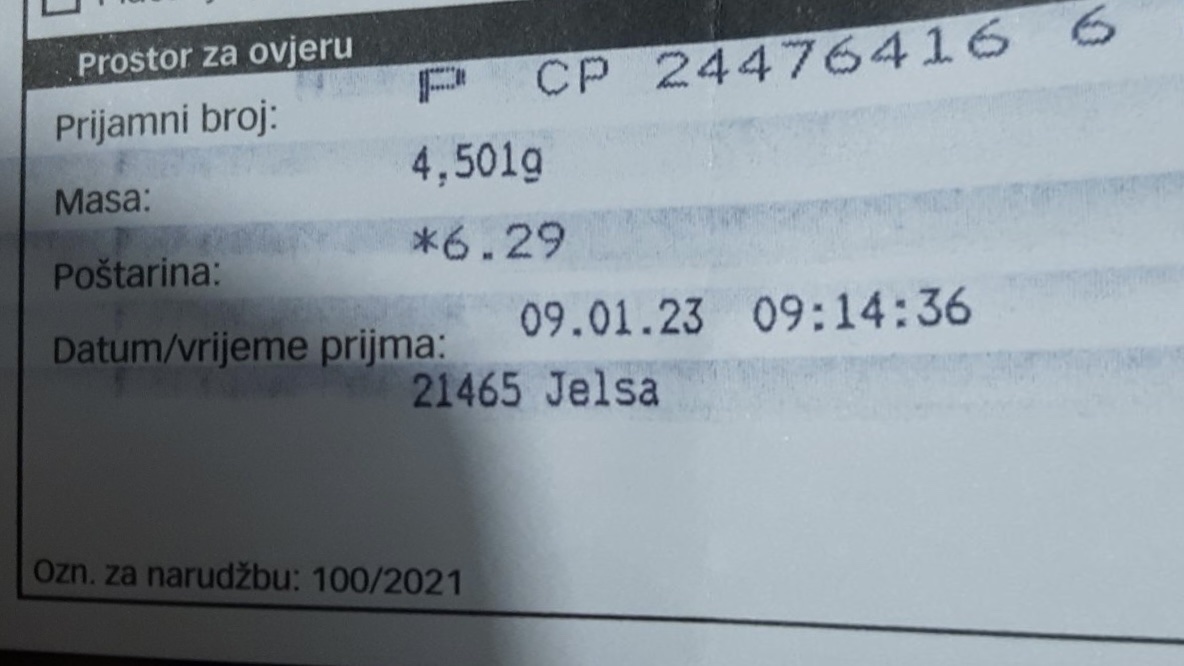
A package of goodies was dispatched by my mother-in-law to her daughter at 09:14 with Croatian Post (Hrvatska Posta), early enough to make the ferry for onward delivery to Zagreb.
Time passed.
A lot of time.
On Friday, January 20, a phone call to HP elicited the information that the package was in the system at Velika Gorica, close to Zagreb, and would be delivered soon.
When nothing had arrived the following Monday, a phone call to ask if we could collect the package rather than waiting was met with a negative. It would be there soon.

Seven phone calls in all, including from 28 and 38 minutes of waiting time (and I understand the calls are charged), resulted in nothing. Apart from the inconvenience of having to wait at home on the off chance of the delivery, the greater concern was the state of the lemons and how they would function as future stars in the evening gin and tonics after more than a fortnight in captivity.
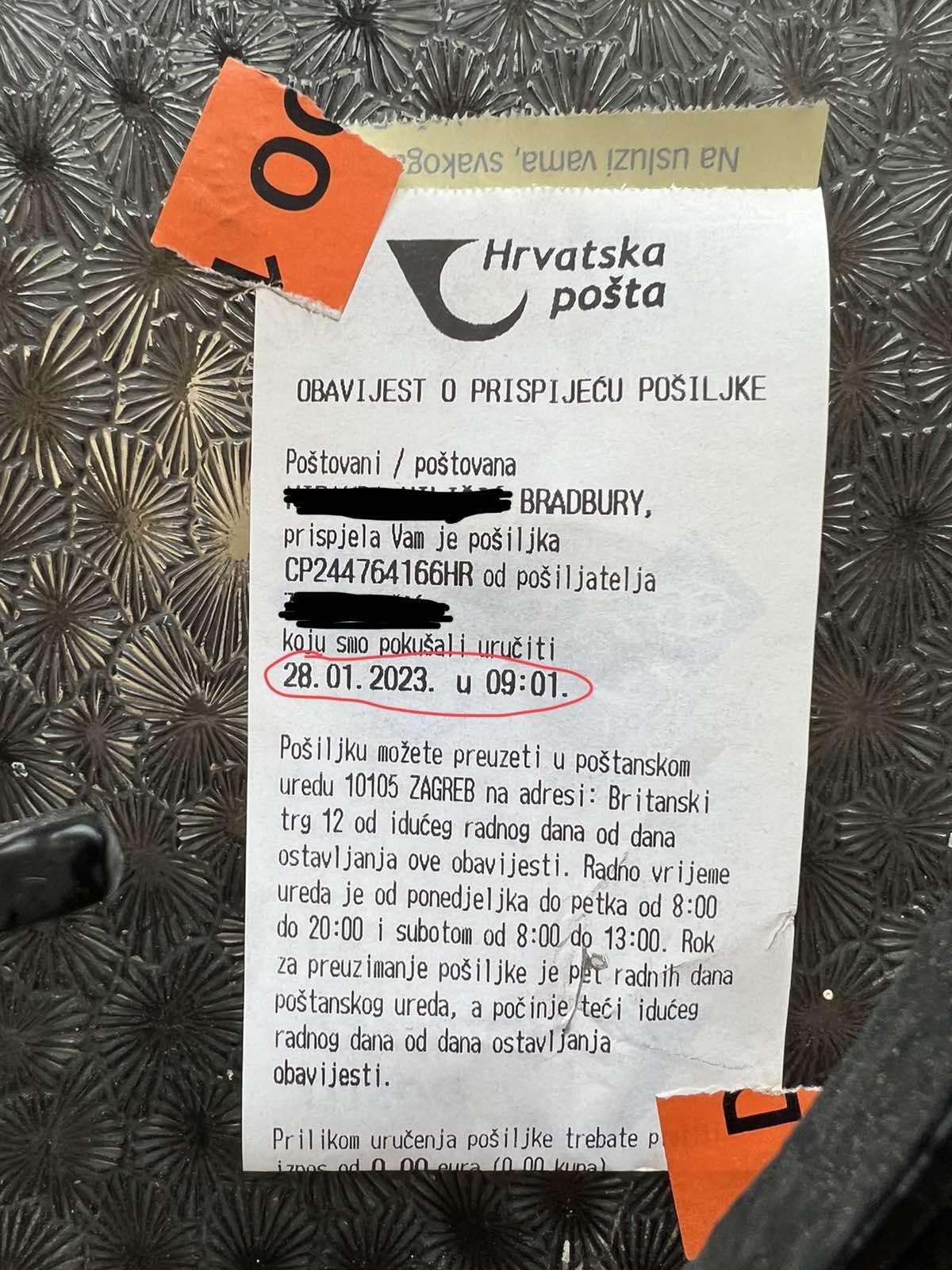
Finally, on Saturday, January 28, some 19 days after the lemons started their journey from Croatia's Premier Island to the Big Smoke, the lemons arrived.
In case we might think that the Kings of HP had some discriminatory policies towards lemons, a simultaneous example of delivery incompetence was ongoing with another shipment, this time from Germany.
The timeline...
January 11 - online ordering in Germany
January 14 - order dispatched.
January 16 - arrived in the Kingdom of HP.
January 26 - still no lemons and a phone call to cancel the German order, after 10 days of it being stuck in the Kingdom of HP, and an enquiry about the health of our lemons.
January 27 - miraculously, the German order arrives (one can only speculate if an email to the supplier had anything to do with it)
January 28 - our heroic lemons, a little worse for wear after their arduous 19-day journey without sunlight, arrive at their final destination, the tonic water already chilling in the fridge.
Now, don't let this tale of the lemons who did not become lemonade discourage you, for there is a MUCH more efficient system of moving vegetables and anything else around the country, called the 'Balkan DHL Express', the fastest, cheapest and most reliable delivery service in all Europe. Check out our video explanation here and below.
I will tag Hrvatska Posta when I share this article to see if they have a policy on lemon compensation.
But it is not all bad. And here is the happy - and quite incredible (if you follow the joys of Croatian bureaucracy, prepare for a WOW moment) case of Croatian bureaucracy on fire.
The timeline...
January 16 - online application to change the name in the cadaster for a piece of property on Hvar.
February 1 - a letter from the cadaster in Stari Grad delivered to Zagreb with the updated cadaster details.
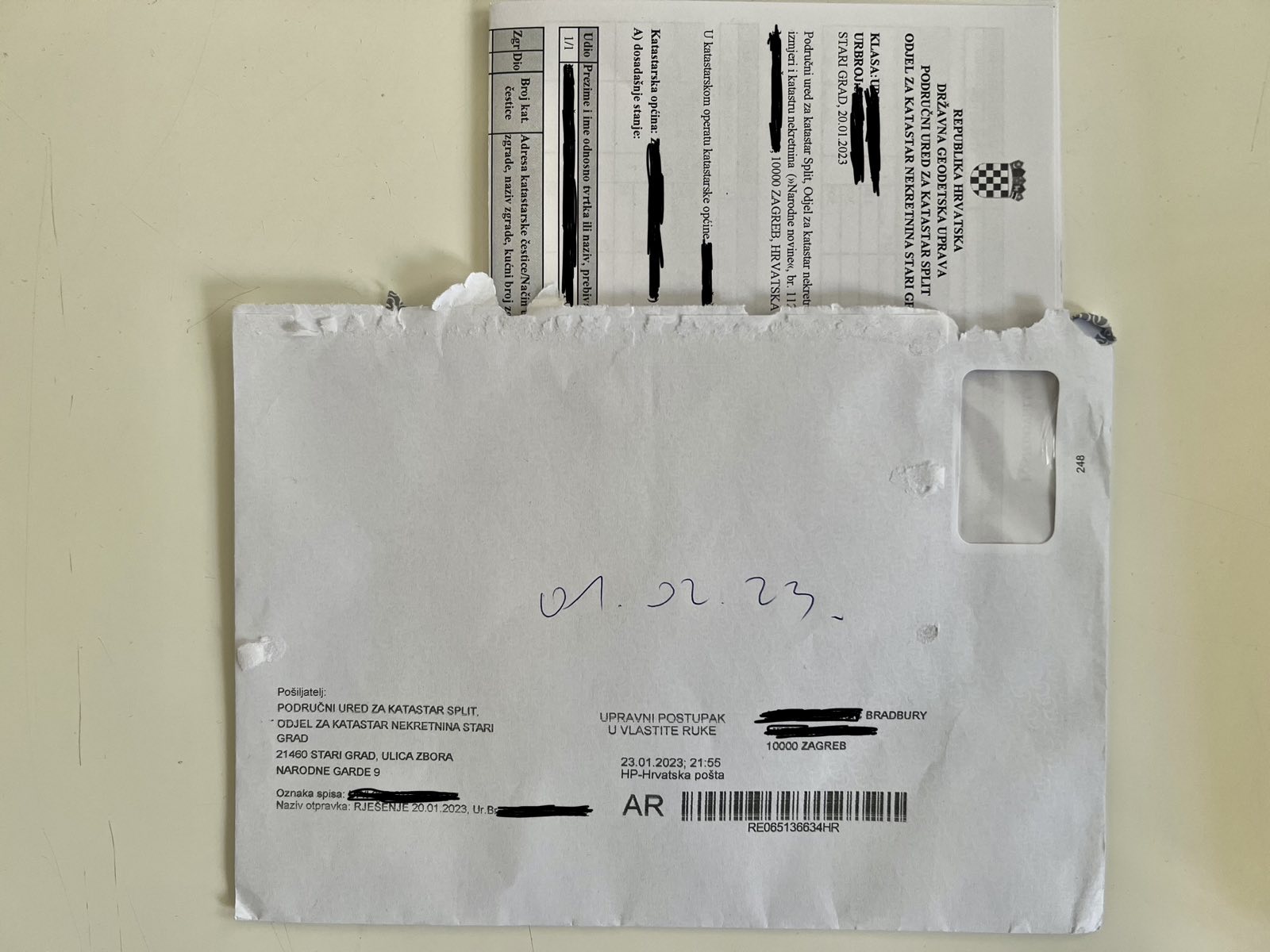
Just 16 days, INCLUDING delivery time. The same journey the lemons took from Hvar to Zagreb.
Croatia - a delightful mixture of Absurdistan with the best lifestyle in Europe with a sprinkling of Balkan insanity on top. Why would you live anywhere else?
Now to investigate how to get my lemons delivered by the Stari Grad cadaster.
****
What is it like to live in Croatia? An expat for 20 years, you can follow my series, 20 Ways Croatia Changed Me in 20 Years, starting at the beginning - Business and Dalmatia.
Follow Paul Bradbury on LinkedIn.
Subscribe to the Paul Bradbury Croatia & Balkan Expert YouTube channel.
Croatia, a Survival Kit for Foreigners is now available on Amazon in paperback and on Kindle.

Adriatic Gastro Show Opened in Spaladium Arena in Split
February 2, 2023 - A prominent international festival of gastronomy and tourism, the Adriatic Gastro Show, opened on Wednesday, the 1st of February, in the Spaladium arena in Split.
All visitors to the festival will have a chance to see the equipment for catering facilities and food preparation in the hospitality and tourism industry for the next four days, writes 24Sata.
"About eight hundred exhibitors from thirty-seven countries will be presenting on 12,000 square meters of space. Therefore, the visitors will be able to see all the novelties for equipping hospitality establishments as well as all the novelties related to the preparation of food and drinks for the hospitality industry," said the director of the fair, Josip Bužančić.
He added that everything that hospitality and tourism professionals might find interesting for themselves or their businesses would be presented at the fair.
Before the opening of the Adriatic Gastro Show, however, the mayor of Split, Ivica Puljak, expressed that he was against hosting the Adriatic Gastro Show in the Stadium arena. As he pointed out, the Spaladium Arena was closed at the end of last year. On the other hand, the bankruptcy administrator of the company that manages the Spaladium Arena (Sportski grad TPN), Natalija Mladineo, pointed out that the contract for the fair was signed with the company "Poslovi mediji" in May last year, long before the Arena was closed at the end of December.
The director of the Adriatic Gastro Show, Josip Bužančić, simply and shortly commented that, as organizers, they are not interested in politics.
"The owner of the Spaladium Arena is neither the City of Split, nor the Split-Dalmatia County, nor the state. Spaladium Arena is a private facility where the private company 'Poslovni mediji' is organizing this event. We just want to do our job," said Bužančić.
For more, make sure to check out our dedicated News section.
Ilocki Podrumi, Croatian Wine Fit for the Queen's Coronation in 1953
February 2, 2023 - Croatia has some incredible wines and some of the wine stories are equally incredible. Learn more about the tales of Ilocki Podrumi, in Croatia's easternmost town of Ilok.
It is closer to Zagreb than Split, and yet for many, Croatia's easternmost town of Ilok seems to be at the end of the world.
Make the journey, however, and you will be rewarded with wines fit for royalty and a wine-making tradition dating back to Roman times.
Meet the wine which was served at the Coronation of Queen Elizabeth II in 1953, and again at the weddings of Princes William and Harry.
And then hear the incredible story of how 1,200 bottles of the royal 1947 Traminac were saved after the Serbs took control of the winery during the Homeland War.
This video was shot by Steve Tsentserensky and edited by Igo Vuk in November 2021, while the Queen was still alive, which explains the words in the National Anthem at the end.
You can learn more about Ilok and eastern Croatia in my Total Croatia News article of that trip, Slavonia, Full of Life: Time to Tell the Truth about Eastern Croatia.
****
What is it like to live in Croatia? An expat for 20 years, you can follow my series, 20 Ways Croatia Changed Me in 20 Years, starting at the beginning - Business and Dalmatia.
Follow Paul Bradbury on LinkedIn.
Subscribe to the Paul Bradbury Croatia & Balkan Expert YouTube channel.
Croatia, a Survival Kit for Foreigners is now available on Amazon in paperback and on Kindle.




